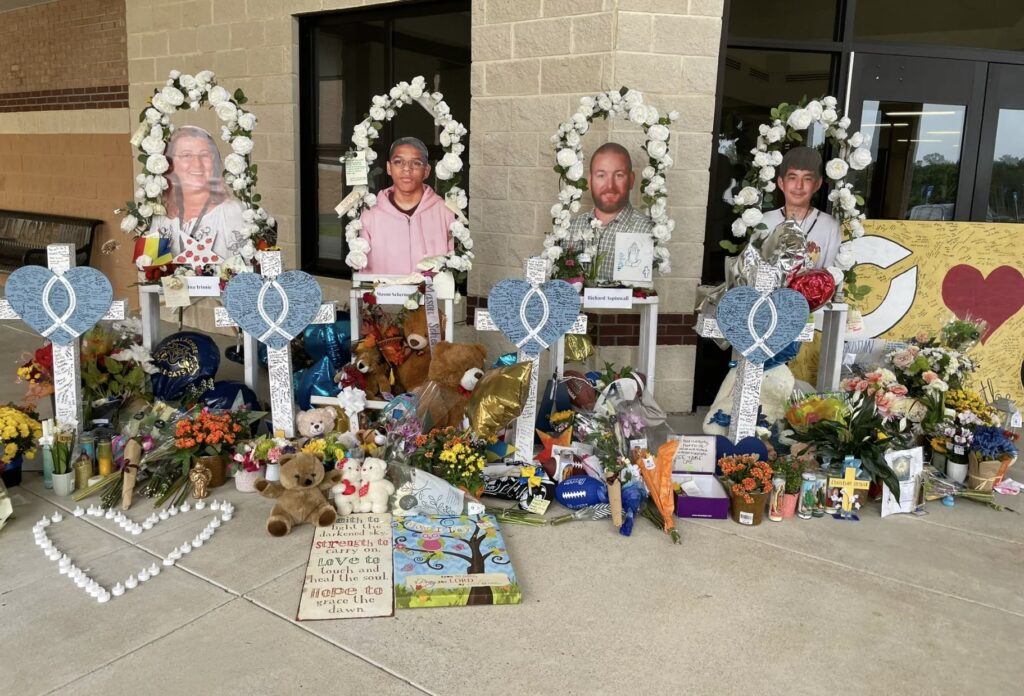This story was produced by MindSite News, an independent, nonprofit journalism site focused on mental health. Get a roundup of mental health news in your in-box by signing up for the MindSite News Daily newsletter here.
“Pray for Apalachee High School.”
Even in the afternoon rain, that message endures on a posterboard at a shrine to the victims of the nation’s latest school shooting. It expresses the prevailing sentiment in the small community of Winder, Georgia, about 50 miles northeast of Atlanta. Thoughts and prayers overflow here, since two students and two teachers were killed on September 4 when a 14-year-old opened fire with an AR-15-style rifle. Nine others were wounded.
Winder also illustrates a new paradigm for American disaster response. The Georgia Emergency Management and Homeland Security Agency opened a week-long Community Recovery Center in a recreation center, using the gym as a place where school employees, students, victims’ families, first responders, and concerned people in the community could connect with counselors. Churches offered spiritual care, health organizations provided on-site therapy and psychological first aid, and pet therapy organizations brought emotional support dogs.
By the end of the week, 317 people had come through the center for comfort and support.
Apalachee High school is set to reopen the week of September 23. Meanwhile, people continue to bring flowers, candles, messages, and artwork to makeshift memorials at the school’s front entrance and around the flagpole where U.S. and state flags fly at half-mast.
On a recent afternoon, the sisters of Christian Angulo, a 14-year-old freshman who died in the shooting, knelt before his photo at the memorial and read some of the messages left to honor him. Nearby, Sara Schneider stood at a respectful distance, keeping a protective eye. A Winder resident, she is still mourning the death of her son Bowen, who died in June 2023, 12 days after he was born prematurely. Her struggle to find child-focused, sibling grief support for her two other sons inspired her to found the nonprofit Bowen Walker Foundation.
Through the foundation, she helps bereaved children and their families receive therapy – through referrals, financial support, and even transportation. Now she is reaching out to the circles of grief created by another school shooting (see list of school shootings here). “I’m getting students in to see counselors as quickly as I possibly can,” Schneider said. “We’re not going to leave them to deal with this alone.”
Kate’s Club, an Atlanta-based nonprofit focused on grief support for children, teens, and young adults, had just arranged to provide school-based grief groups for students and training for teachers and counselors in Barrow County schools, although the program had not yet begun. When news of the Winder shooting broke, “the first thought was, ‘We need to be there,’” said Lane Pease Hendricks, director of education and innovative programs.
As one of their first tasks, grief experts from Kate’s Club joined other therapists and counselors to accompany students one-on-one into the high school to retrieve their belongings. They also plan to remain involved in Winder, with resources and support. “This is going to be a lifelong journey for the entire community,” said Kate’s Club Executive Director Lisa Aman.
While it’s common for children and teens who experience a school shooting to have immediate reactions to trauma, such as trouble sleeping or concentrating, only a small portion will go on to develop post-traumatic stress disorder, said David Schonfeld, a developmental-behavioral pediatrician who directs the National Center for School Crisis and Bereavement at Children’s Hospital Los Angeles.
According to Schonfeld, there’s no formula for figuring out who is most likely to develop PTSD. While all children can benefit from support in coping with a tragedy, those experiencing ongoing symptoms need to be individually assessed, he said.
Schonfeld and his team have responded to many traumatic events, including after the September 11, 2001, terrorist attack in New York City, Hurricane Katrina in New Orleans, and shootings at Sandy Hook Elementary School in Newtown, Connecticut, and Marjory Stoneman Douglas High School in Parkland, Florida. Now they have added Winder, Georgia, to their roster.
A week after the shooting, at the request of the Barrow County School System, Schonfeld and a colleague began training faculty and staff at Apalachee High School in how to support the students and help the school community move forward.
Despite the tragedy, he maintains a hopeful perspective, based on his extensive work.
“Some people actually end up with post-traumatic growth. They may emerge with new insights, more empathy, more spirituality – realign their goals for what they wish to do,” Schonfeld said. “People are forever changed, but they’re not necessarily permanently damaged.”

